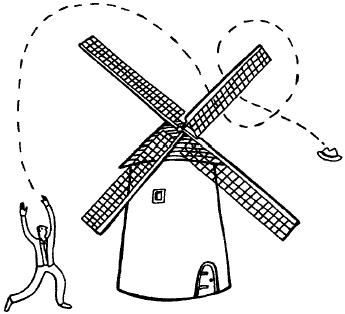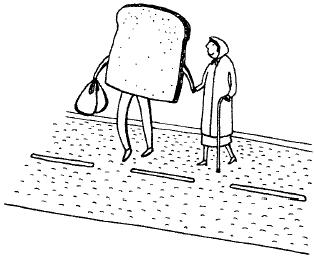
(Dzongkha, Bhutan)
the nose doesn’t smell the rotting head
However much we like to think that all those odd-looking, strange-speaking people around the world are different from us, the shocking evidence from language is that we are all too similar. Don’t most of us, whether we live in city, shanty-town or rural bliss, know one of these?
hallab el-namtnleh (Syrian Arabic) a miserly person (literally, ant milker)
krentenkakker (Dutch) one who doesn’t like spending money (literally, someone who shits raisins)
kanjus makkhichus (Hindi) a person so miserly that if a fly falls into his cup of tea, he’ll fish it out and suck it dry before throwing it away
yaalik (Buli, Ghana) sponging, always expecting help or gifts from others without being willing to offer help
ego (Rapanui, Easter Island) slightly soiled
hiya (Tagalog, Philippines) bashful
incoherent (French) inconsistent
liar (Malay) undomesticated
urn (Bosnian) mind, intellect
slug (Swedish) astute
Fortunately, those are not the only kind of people on our beautiful and fragile planet:
pagad (Manobo, Philippines) to show consideration for a slow-walking person by also walking slowly, so that he can keep up
manàra-drìmitra (Malagasy, Madagascar) to involve oneself in another’s calamity by seeking to extricate him
elunud (Manobo, Philippines) to go deliberately to someone’s aid and share in his misfortune, regardless of the obviously ill-fated outcome
If only people displaying such fine qualities were always pure of heart. But the Italians are not the only ones who understand carita pelosa, generosity with an ulterior motive:
mutakarrim (Persian) one who makes pretensions to generosity
Tantenverführer (German) a young man of excessively good manners whom you suspect of devious motives (literally, aunt seducer)
uunguta (Yamana, Chile) to give much more to one than to others
Then again, sometimes the totally sincere can be altogether too much:
Bärendienst (German) an act someone does for you thinking they are doing you a favour, but which you really didn’t want them to do
arigata-meiwaku (Japanese) an act someone does for you thinking they are doing you a favour, but which you really didn’t want them to do; added to which, social convention now requires you to express suitable gratitude in return
In Greek megla (derived from ‘made in England’) denotes elegance and supreme quality and jampa (derived from ‘made in Japan’) means very cheap. Other languages use rather different standards of Englishness in their idioms:
s kliden Angličana (Czech) as calm as an Englishman
ubbriaco come un marinaio inglese (Italian) as drank as an English sailor
filer à l‘anglaise (French) to slip away like the English
Rather than being a sucker who takes consideration for other people’s feelings too far, perhaps it would be better to be one of those enviable individuals who simply doesn’t give a damn?
menefreghista (Italian) a person who has an ‘I don’t care’ attitude
piitaamaton (Finnish) unconcerned about other people’s feelings
i v oos nye doot (Russian) not to give a damn (literally, it doesn’t blow in one’s moustache)
no me importa un pepino (Spanish) I don’t care two hoots (literally, I don’t care a cucumber)
jeter son bonnet par-dessus les moulins (French) to throw caution to the winds (literally, to throw one’s hat over the windmills)

On second thoughts, perhaps not. For the line between self-confidence and self-centredness is always horribly thin:
szakbarbár (Hungarian) a crank who can think of nothing but his/her subject
iakićagheća (Dakota, USA) one who is unreasonable in his demands, one who keeps asking for things after he should stop
kverulant (Czech) a chronic complainer, a litigious person
hesomagari (Japanese) perverse or cantankerous (literally, bent belly button)
The Germans have pinpointed some particularly egotistic types:
Klugscheisser someone who always knows best (literally, smart shitter)
Warmduscher someone who is easy on himself (literally, warm showerer)
Trittbrettfahrer to take advantage of someone else’s efforts without contributing anything (literally, the person who rides on the stepping board of a bus or train without buying a ticket)
And it’s another short step from egotism to conceit:
péter plus haut que son cul (French) to think highly of yourself (literally, to fart higher than your arse)
creerse la ultima Coca-Cola en el desierto (Central American Spanish) to have a very high opinion of oneself (literally, to think one is the last Coca-Cola in the desert)
nosom para oblake (Serbian) he’s conceited, puffed up (literally, he’s ripping clouds with his nose)
khenh khang (Vietnamese) to walk slowly like an important person, to put on airs
cuello duro (Spanish) a snob, stuck-up (literally, hard or stiff neck – from keeping one’s nose in the air)
Almost as irritating as the conceited and the pompous are those who fail to see that, as they say in the Kannada language of Southern India, ‘Tumbida koDa tuLukuvudilla’, the pot which is full does not splash:
farolero (Spanish) a show-off (literally, a lantern maker)
m’as-tu-vu (French) a show-off (literally, one who constantly asks other people ‘Did you see me?’)
Spesenritter (German) someone who shows off by paying the bill on the firm’s money (literally, expense knight)
poshlost (Russian) ostentatious bad taste
jor-joran (Indonesian) to compete in showing off one’s wealth
elintasokilpailu (Finnish) keeping up with the Joneses
And yet, despite their obvious failings, both snobs and show-offs are often surrounded by the human equivalent of a benign parasite. As the Spanish say, ‘La lisonja hace amigos, y la verdad enemigos’, flattery makes friends and truth makes enemies:
chupamedias (Chilean Spanish) a sycophant (literally, sock sucker)
banhista (Portuguese) someone who soft-soaps another
digdig (Manobo, Philippines) to praise a person for the quality which he lacks in order to encourage him to develop that quality
jijirika (Chichewa, Malawi) to curry favour by doing more than expected, but not necessarily well
Can it get worse? Unfortunately it can:
lū-lū (Hindi) an idiot, nincompoop
gugbe janjou (Tibetan) a stupid person trying to be clever
kaptsn (Yiddish) one who does not amount to anything and never will
eldhus-fifi (Old Icelandic) an idiot who sits all day by the fire
el semaforo de medianoche (Venezuelan Spanish) a person no one respects and of whom everyone takes advantage, a pushover (literally, traffic light at midnight)
‘It is foolish to deal with a fool,’ say the practical Japanese, though the Chinese wisely observe that ‘He who asks is a fool for five minutes, but he who does not ask remains a fool forever.’ Such observations reveal what the Catalans call seny, a canny common sense. Others value such qualities too:
ha sale in zucca (Italian) he has common sense (literally, he’s got salt in the pumpkin)
lapchaty goos (Russian) a sly old fox (literally, a cunning goose)
baser (Arabic) one with great insight or one who is blind
In Italy you are stupido come l’acqua dei maccheroni, as stupid as macaroni water; in Lithuania, kvailas kaip žasis, as silly as a goose; while in France you can be as stupid as une cruche (a pitcher), un pot (a pot) or un chou (a cabbage). But even idiots are not necessarily all they seem:
adalahendry (Malagasy, Madagascar) a person ignorant yet wise in some things
Spruchkasper (German) a fool full of wise sayings
apo trelo kai apo pedi mathenis tin aletheia (Greek proverb) from a crazy person and from children you learn the truth
Although the very young can delight us with their wonderful and surprising remarks, naivety is not, sadly, a state of mind that will work for a lifetime:
creer en pajaritos preñados (Venezuelan Spanish) to be credulous (literally, to believe in pregnant birds)
yelang zida (Chinese) ludicrous conceit stemming from pure ignorance
lolo (Hawaiian Pidgin) someone who would be glad to give you the time of day, if he knew how to read a clock
How wonderful it is when we meet that rare person who just gets it right all the time:
katundu (Chichewa, Malawi) a person with outstanding positive qualities
Lieblingsstück (German) the favourite item of a collection (said of someone special)
para quitar el hipo (Latin American Spanish) very impressive; astonishing (literally, enough to cure the hiccups)
es un pedazo de pan (Spanish) he/she’s a good person/it’s a good thing (literally, he/she/it is a piece of bread)

chassez le naturel, il revient au gallop (French) chase away the natural and it returns at a gallop
aus einem Ackergaul kann man kein Rennpferd machen (Swabian German) you cannot turn a farm horse into a racehorse
dhanab al kalb a ’waj walaw hattaytu fi khamsin galib (Arabic) the dog’s tail remains crooked even if it’s put in fifty moulds
vuk dlaku mljenja ali æud nikada (Croatian) a wolf changes his coat but not his attitude
die Katze lässt das Mausen nicht (German) the cat will not abandon its habit of chasing mice
chi nasce quadrate non muore tondo (Italian) if you are born square you don’t die round
karishkirdi kancha baksang dele tokoigo kachat (Kyrgyz) no matter how well you feed a wolf it always looks at the forest
gorbatogo mogila ispravit (Russian) only the grave will cure the hunchback